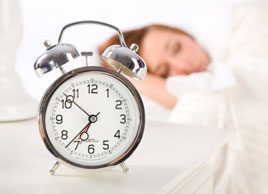How much sleep do you really need?
If you struggle to get eight hours of shut-eye, read on to find out how much sleep you should be getting

Source: Web exclusive, October 2009
If you’re like many of us, juggling a career and a family while trying to keep everyone in clean socks doesn’t leave much time for sleep. Sure, we all try to get the commonly recommended eight hours of shut-eye, but do we really need all that rest? After all, so many people seem to function just fine on just five or six hours. We asked Helen Driver, a Kingston, Ont.-based sleep researcher and president of the Canadian Sleep Society, to help us understand how much sleep we really need’and why.
Most people feel their best after eight hours of sleep
The idea that it’s necessary to get eight hours of sleep each night partly comes from studies that ask people how much time they normally spend sleeping.
For example, in a survey conducted by researchers at Queen’s University in Kingston, Ont., more than 17,000 students in 24 countries were asked how much sleep they got each night. Sixty-three percent of participants said they slept from seven to eight hours.
“[Eight hours] is the norm for the amount of time that most people sleep," says Driver. "On an individual basis, it’s the amount of sleep that allows you to wake up feeling refreshed and able to stay awake during the day.”
Culture influences our need for sleep
The amount of time we sleep is also based on the demands of our society. North American adults are what experts call monophasic sleepers, meaning we sleep and awaken only once in a 24-hour period and we do so during the darkest time of day. But it wasn’t always this way, notes Driver.
"When we were still keeping ourselves warm with fires, people would go to bed when it got dark, have one good sleep, wake up in the middle of the night, stoke the fires and go back to bed for a second phase of sleep," she says.
Electricity eliminated our need to doze off when the sun goes down, so our sleeping habits evolved. Driver says that what’s accepted as the normal amount of sleep is still changing to meet cultural demands.
"Our sleep time has decreased over the last two decades. Before, people were sleeping closer to nine hours. Some people argue that we live in a sleep-restricted society. I would predict that over the next few years, people will decrease their sleep time [further]," she says.
Sleep need is genetic
We see that sleep duration runs in families, says Driver. Now there’s some proof that your need for sleep might be genetic. A recent study by a group of researchers from the University of California, San Francisco found that a mother and daughter had the same rare, mutated gene that allowed them to feel refreshed after only six hours of sleep. When scientists recreated the mutated gene in lab mice, they found that the mice also slept for fewer hours and were observed to be well-rested when they awoke. "This is the first time that [scientists] have been able to isolate a genetic association to short sleep time," says Driver. This discovery could lead researchers to better understand how to treat people with chronic sleep disorders.
The amount of sleep you need is personal
If you find that you’re waking up well-rested after less than eight hours, don’t worry about it, says Driver: that might be the amount of sleep that works best for you. “Some people may be more efficient sleepers and get what they need in a shorter amount of time," she notes. "Everyone wants to fit into a normal curve, but if you’ve had four or five hours of sleep and you can get up and function during the day, then you don’t have a problem. You can’t force yourself to sleep if you don’t need it.”
How to tell if you’re not getting enough sleep
Feeling exhausted and unable to function during the day is a sign that you’re not getting the shut-eye you need. Driver says it’s normal for everyone to go through bouts of disturbed sleep (if you have a new baby in the house, for example), so there’s no need to be concerned if you get less sleep for a month or two at a time. "Our system is made to catch up and recover [from lack of sleep] when you can," she says. However, if you’re routinely waking up groggy over several years, your health may be at risk.
"Insufficient sleep can result in an impact on immune function and cardiovascular risk," says Driver. There’s also a link between weight gain and reduced sleep. Studies have also shown a link between sleep deprivation and increased risk of developing type 2 diabetes.
Tips for getting more sleep
If you’re not getting enough rest on a regular basis, Driver suggests seeking help to adjust your sleep routine. "Cognitive behavioural therapy teaches people about good sleep hygiene and targets people’s beliefs about sleep," she says.
If you’d rather lean some do-it-yourself sleep tactics, click through for five steps for a perfect night’s sleep.
Don’t miss out! Sign up for our free weekly newsletters and get nutritious recipes, healthy weight-loss tips, easy ways to stay in shape and all the health news you need, delivered straight to your inbox.




